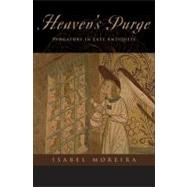Heaven's Purge Purgatory in Late Antiquity
, by Moreira, Isabel- ISBN: 9780199736041 | 0199736049
- Cover: Hardcover
- Copyright: 11/17/2010
The sixth-century bishop Gregory of Tours described how mixing water with dust from the tomb St. Martin would create a potion that would act as a celestial purgative. Indeed, Gregory could observe Christians being purged of sickness and sin all around him. By contrast, God's willingness to purge Christians of their sin after death was a more complicated proposition. As a process hidden from view, it raised questions: What was purgatory like? Who would experience it? Did purgatory purify souls, punish them, or both? And how painful would it be? This book explores purgatory's earliest history from the first century to the eighth. This was an era in which the idea that sinful Christians might improve their lot after death was often contentious, even heretical. In this, the first study focused on purgatory's history in late antiquity, Moreira explores a wide variety of interests and influences at play in purgatory's early formation. Some of the influences discussed are ideas about punishment and correction in the Roman world, slavery, the value of medical purges at the shrines of saints, and the authority of visions of the afterlife for informing Christians on the hereafter. Finally, this study challenges the deeply ingrained supposition that purgatory was a symptom of barbarized Christianity. It assesses the extent to which Irish and Germanic views of society, and the sources associated with them - penitentials and legal tariffs - played a role in purgatory's formation. Highlighting the importance of the Anglo-Saxon contribution to purgatory, special attention is given to the writings of the last patristic author of antiquity, the Northumbrian monk, Bede.






